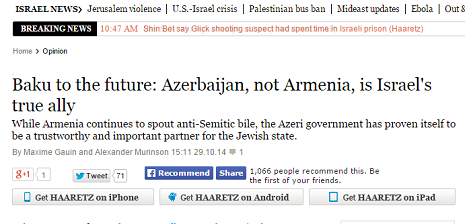The article has been published in Israel’s Haaretz newspaper.
The authors reacted to the earlier Haaretz` op-ed from Yair Auron’s (Israel must not sell arms to Azerbaijan), saying that it is a strange mixture of baseless accusations and absurd parallels.
“The very notion of Israel’s national interest is absent from the article. Now 40 percent of the oil consumed in Israel comes from Azerbaijan, a crucial client for Israeli high-tech industries. Meanwhile, the Armenian government has established close relations with the Iranian mullahs,” the authors wrote.
As relations between Israel and Azerbaijan have improved, anti-Semitic diatribes appear more regularly in Armenian publications, in which Israel and Jews are vilified, said the article.
“Armenia has become a virtually mono-ethnic country, thriving on a daily diet of virulent nationalism bordering on racism,” the authors said.
Already back in the 1970s and 1980s, members of the Armenian Secret Army for the Liberation of Armenia (ASALA) terrorist group have been training at Palestinian bases in the Bekaa Valley in Lebanon, shoulder-to-shoulder with the Black September organization, who attacked the Israeli delegation at the 1972 Munich Olympic Games, according to the article.
The authors said that Auron’s description of Azerbaijan is virtually the opposite of the truth.
The article said that in Azerbaijan, Jews and Christians – including Armenians living in this country – enjoy equal rights with the Muslim majority.
The authors said that the conflict between Armenia and Azerbaijan began when Azerbaijanis were expelled from Nagorno-Karabakh and Armenia.
The conflict between the two South Caucasus countries began in 1988 when Armenia made territorial claims against Azerbaijan.
The article said that in 1992, Armenia, having secured the support of Russia and the nationalist organizations of the Armenian diaspora, attacked Azerbaijan and conquered 20 percent of its territory – not only Nagorno-Karabakh but also seven surrounding districts.
All the Azerbaijanis living in these districts and in Nagorno-Karabakh were expelled or massacred, the authors said.
The article said that in the town of Khojaly, more than 600 Azerbaijanis were systematically exterminated by Armenian armed forces. “Under these conditions, it is no surprise that war rhetoric continues in Azerbaijan.”
The Azerbaijani government has made it clear that it prefers a peaceful solution to retake the territories occupied by Armenia, according to the article.
The Republican Party of Armenia, which has ruled the country since 1998, openly claims its fidelity to Garegin Nzhdeh (1886-1955), a leader of the Armenian Revolutionary Federation `Dashnaksutyun`, according to the article.
“Nzhdeh went to Germany at the beginning of World War II and became a member of the Armenian National Council, established in 1942 with the blessing of Alfred Rosenberg, Hitler’s minister for the eastern occupied territories. Several places received the name of Nzhdeh after independence, including a metro station,” the authors wrote.
“Anti-Semitic expressions are recurrent in Armenia today. The only monument in the country dedicated to the Holocaust has been repeatedly vandalized, but the perpetrators were never arrested.”
The authors wrote that in short, Yair Auron is totally wrong: wrong in terms of Israel’s national interests, and incorrect with his remarks about Azerbaijan.
More about:


















-1745485667.jpg&h=190&w=280&zc=1&q=100)





























